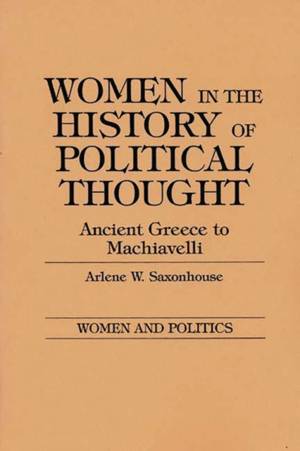
Door een staking bij bpost kan je online bestelling op dit moment iets langer onderweg zijn dan voorzien. Dringend iets nodig? Onze winkels ontvangen jou met open armen!
- Afhalen na 1 uur in een winkel met voorraad
- Gratis thuislevering in België vanaf € 30
- Ruim aanbod met 7 miljoen producten
Door een staking bij bpost kan je online bestelling op dit moment iets langer onderweg zijn dan voorzien. Dringend iets nodig? Onze winkels ontvangen jou met open armen!
- Afhalen na 1 uur in een winkel met voorraad
- Gratis thuislevering in België vanaf € 30
- Ruim aanbod met 7 miljoen producten
Zoeken
Women in the History of Political Thought
Ancient Greece to Machiavelli
Arlene Saxonhouse
Hardcover | Engels
€ 161,45
+ 322 punten
Uitvoering
Omschrijving
As one reads the classic works of political philosophy one is limited to books written by male authors. When reading interpretations of these authors it seems that the male philosophers were only concerned with the male citizen. Arlene Saxonhouse argues that these classic authors, from Plato to Machiavelli, while they praised the world of male public action, also recognized that the public world was not the totality of human existence. These authors, Saxonhouse says, saw that a private sphere which included women existed, and that that sphere set limits upon and defined the possibilities of the public world. She argues further that the authors did not ignore the female, rather it is the inadequacies of modern scholarship that have made them appear to have done so. This volume shows how women have been an integral part of political philosophers' vision of the world, not a scattered side show in certain philosophical works.
Specificaties
Betrokkenen
- Auteur(s):
- Uitgeverij:
Inhoud
- Aantal bladzijden:
- 210
- Taal:
- Engels
Eigenschappen
- Productcode (EAN):
- 9780275901608
- Verschijningsdatum:
- 15/08/1985
- Uitvoering:
- Hardcover
- Formaat:
- Genaaid
- Afmetingen:
- 156 mm x 234 mm
- Gewicht:
- 494 g

Alleen bij Standaard Boekhandel
+ 322 punten op je klantenkaart van Standaard Boekhandel
Beoordelingen
We publiceren alleen reviews die voldoen aan de voorwaarden voor reviews. Bekijk onze voorwaarden voor reviews.











